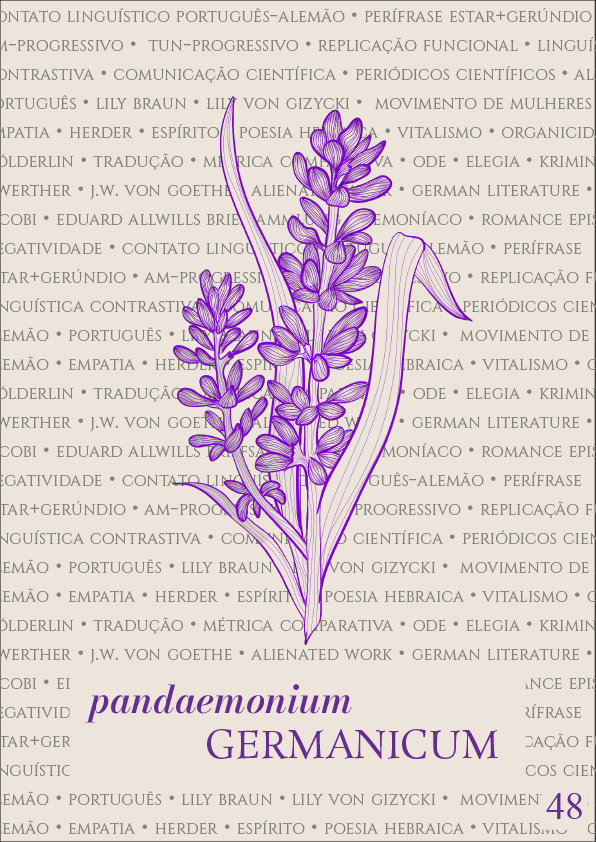n the footsteps of murderous sadness: depersonalization, alienated labor and Kriminal-geschichtein Die Leiden des jungen Werthersby J.W. von Goethe
DOI:
https://doi.org/10.11606/1982-8837264886Keywords:
Kriminalgeschichte, Werther, J.W. von Goethe, Alienated work, German literatureAbstract
190 years after the departure of the renowned German writer, one of his early works is of great importance today in order to understand the relevance of his criticism of societies entrenched in the annulment of individuals. This article aims to dwell on two specific points of the famous novella. The first point has to do with the incipient bureaucratization of work at the dawn of capitalist modernity in eighteenth-century Germany and the deformation of the subject, the consequence of which is an existence mediated by the thanatic. This primacy of the thanatic becomes the creation of a criminal potential and an alienation with a marked homicidal accent. The second point is related to a reading proposal: Goethe appropriates the elements of the Kriminalgeschic hten to point out a series of social, religious and political problems linked to the revolutionary aspirations of the German bourgeoisie of the period. The conjunction of both elements allows to renew the importance of the novella in relation to a critique of the oppressive public legal, social and economic forms that are found in the contradictory ideological structures of modernity in Germany.Downloads
References
ALTAMURA,Christopher.The Sorrows of Modern Subjectivity. Capital, Infinity Disease and Werther’s Hysterical Neurosis.Fast Capitalism, v. 16, n. 2, 55-64, 2019.
BODAS FERNÁNDEZ,Lucía.El sujeto burgués en el Werther de Goethe: inactividad y fracaso. Eidos. Revista de filosofía, n. 8, 82-102, 2008.
GOETHE,Johann Wolfgang von.Los sufrimientos del joven Werther. Trad. José María Valverde. Barcelona: Editorial Planeta, 1963.
KOŠENINA,Alexander.Es ›ist also keine dichterische Erfindung‹: Die Geschichte vom Bauernburschen in Goethes ›Werther‹ und die Kriminalliteratur der Aufklärung». In: Frick, W.; Golz, J.; Meier, A.; Zehm, E. Goethe-Jahrbuch 2007. Göttingen, Wallstein Verlag, 2007, 189-197.
KOVAL,Martín.La recepción de Las penas del joven Werther de J. W. Goethe en el contexto de la Segunda Ilustración. La reseña de Friedrich Blanckenburg. Pandaemonium Germanicum, v. 24, n. 43, 2021, 96-110.
LUKÁCS,György.Teoría de la novela. Un ensayo histórico-filosófico sobre las formas de la gran literatura épica. Trad: Micaela Ortelli. Buenos Aires, Ediciones Godot, 2010.
LUKÁCS,György.Goethe y su época. Trad: Manuel Sacristán. Barcelona, Ediciones Grijalbo, 1968.
MEYER-SICKENDIEK, Burkhard. Zärtlichkeit. Zu den aristokratischen Quellen der bürgerlichen Empfindsamkeit. In: Kiening, C.; Koschorke, A.; Vogel, J.; Wellbery, E. D. Deutsche Vierteljahrsschrift für Literaturwissenschaft und Geistesgeschichte, 2014, 206-233.
PIVETTA,Carola.El ›caso criminal‹de P.J.A. Feuerbach a Der neue Pitaval. In: Massa, A.; Giovannini, G.; Martins, E. (Eds), Cruce de fronteras, Grenzgänge, Cruzando fronteirasTomo I. Córdoba, Editorial Comunicarte, 2014, 455-463.
RICHTER,Jean-Paul.Vorschule der Ästhetik. München, Carl Hanser Verlag, 1963.
SAFRANSKI,Rüdiger.Goethe. La vida como obra de arte. Buenos Aires: Tusquets Editores, 2015.
VEDDA,Miguel.Leer a Goethe. Buenos Aires: Editorial Quadrata, 2015.
VON PETERSDORFF,Dirk.›Ich soll nicht zu mir selbst kommen‹. Werther, Goethe und die Formung moderner Subjektivität. In: Frick, W.; Golz, J.; Zehm, E., Goethe-Jahrbuch 2006. Göttingen, Wallstein Verlag, 2006, 67-85.
Downloads
Published
Issue
Section
License
Copyright (c) 2022 Pandaemonium Germanicum

This work is licensed under a Creative Commons Attribution-NonCommercial-NoDerivatives 4.0 International License.



